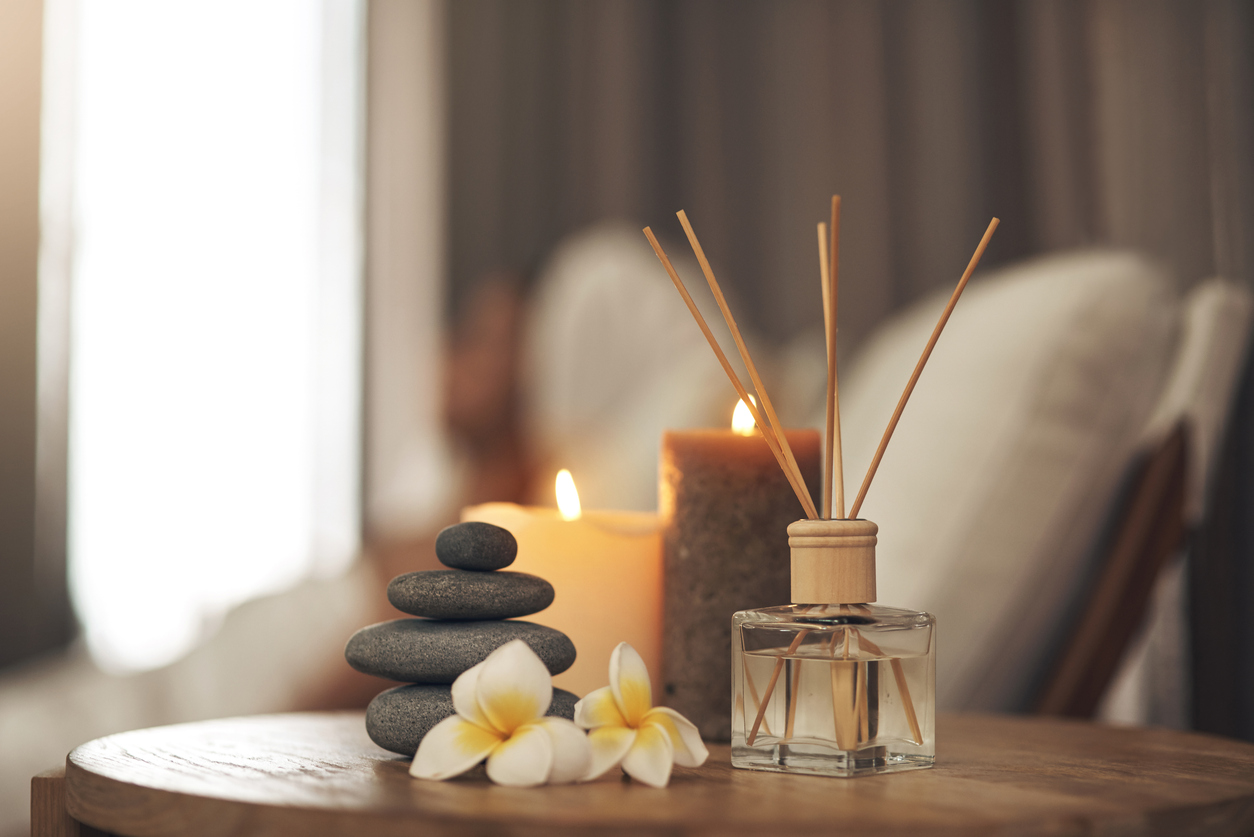Essential oils and aromatherapy often seem peculiar, and some might be reluctant to experiment. However, it’s less complex and mysterious than you might think.
Aromatherapy appeals to our sense of smell by interacting with the olfactory cells. These have tiny hairs that help recognize specific aromas, sending a message to the limbic system. Thanks to the nerve signals and altered brain chemistry, you can experience different mood changes.
But how does that benefit you, and how can you introduce aromatherapy into your daily life?
What are Essential Oils?
Essential oils are plant extracts with powerful scents and therapeutic properties. The extraction process typically involves distillation, expression, or solvent extraction, all requiring meticulousness to capture the volatile plant’s compounds.
Steam distillation is the most common method, and it exposes parts of a plant to steam, causing the essential oil to evaporate and then condensed into a separate container. Meanwhile, expression (cold-pressing) is the typical technique for citrus oils. It requires puncturing the peel and squeezing to release the oil.
As the name implies, solvent extraction uses solvents (e.g., hexane) to dissolve the essential oil from the plant material, producing an absolute and then refining it to remove the solvent.
You can use essential oils in aromatherapy, skincare, and natural remedies as they unlock a holistic approach to wellness. Although their potency requires careful handling and dilution, they’re immensely beneficial for physical and mental health when used correctly.
What is Aromatherapy?
Aromatherapy represents a holistic healing treatment that uses natural plant extracts known as essential oils to improve a person’s physical, mental, and emotional health. This approach isn’t a novelty, as people have been relying on its benefits for centuries.
For instance, ancient Egyptians used it for religious and medical purposes, and 19th-century French physicians leveraged its potential for combating illnesses. However, it was only in 1937 that a French perfumer, René-Maurice Gattefossé, coined the term aromatherapy.
How Does Aromatherapy Work?
The active compounds in essential oils interact with the olfactory system when you inhale or absorb them through the skin. Once you inhale them, aromatic molecules travel to your brain, impacting the limbic system. Keep in mind that the limbic system controls emotions, memories, and behaviors. This direct pathway allows aromatherapy to evoke profound emotional responses, such as relaxation, stress relief, or invigoration.
Moreover, essential oils can exert physical effects when you apply them topically. When you dilute and massage these oils into the skin, your bloodstream will absorb them, resulting in anti-inflammatory, antimicrobial, or analgesic properties. For instance, lavender has calming effects, while peppermint oil can alleviate headaches and sharpen focus.
You can administer aromatherapy through various methods, including inhalation, massage, baths, and diffusers.
What are the Benefits of Aromatherapy?
Aromatherapy offers various benefits, extending beyond appealing scents. After all, essential oils can influence your mind just as much as your body.
Reduced Stress and Anxiety
Many people use aromatherapy because it helps alleviate stress and anxiety. Essential oils like chamomile and bergamot have calming effects, helping to soothe nerves and promote serenity.
Hence, inhaling these fragrances triggers the brain to release feel-good chemicals, such as serotonin, which fosters a sense of tranquility and reduces cortisol levels. Whenever you’re agitated or nervous, try massaging your skin with lavender essential oil, and you’ll experience almost instantaneous relief.
Mood Uplifters
Aromatherapy can be your best friend when you need something to uplift your spirits. Citrus oils like lemon and orange come to the forefront when you’re feeling low, as these oils have a refreshing and energizing aroma. Diffusing these oils can stimulate the senses, boost mental clarity, and combat feelings of fatigue or sluggishness.
For instance, if you must prepare for an exam but struggle to stay awake and understand the lesson, inhale some grapefruit or lime essential oil to stimulate cerebral activity.
More Robust Physical Health
Beyond emotional well-being, aromatherapy can also improve your physical health. Eucalyptus oil, for instance, possesses decongestant properties, making it invaluable for relieving respiratory issues such as congestion and sinusitis.
Tea tree oil is a natural antibacterial and antifungal healer, offering a reliable solution for skin conditions like acne or fungal infections.
Reduced Insomnia
Aromatherapy can also optimize your sleep quality. Oils such as cedarwood and valerian root promote relaxation and help induce a profound and restful state, making them ideal companions for bedtime rituals.






